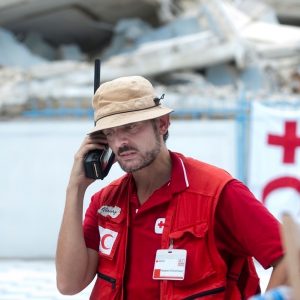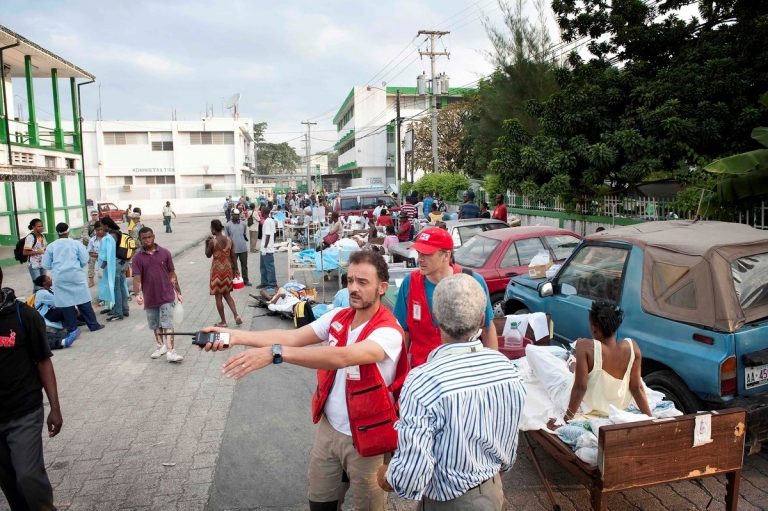 We had the pleasure to connect with Dr. Hossam Elsharkawi, one of our co-instructors for SURG 514: Surgical Care in Humanitarian Disaster Response. Read on to find out about Dr. Elsharkawai’s career, inspiration, hobbies and more!
We had the pleasure to connect with Dr. Hossam Elsharkawi, one of our co-instructors for SURG 514: Surgical Care in Humanitarian Disaster Response. Read on to find out about Dr. Elsharkawai’s career, inspiration, hobbies and more!
Dr. Elsharkawi is currently the Regional Director, Middle East & North Africa, at International Federation of Red Cross and Red Crescent Societies (IFRC), with over 30 years of extensive experience in leading responses to complex humanitarian emergencies. We asked a few question about his career path, current work with IFRC and his experience as an instructor for SURG 514.
Why did you pursue a career in global health?
The Queen once said ” if you have health, you have hope. And if you have hope, you have everything”. Although the needs are massive, global health efforts are a fundamental pillar, without which, developmental gains erode. The COVID pandemic and ensuing global crises demonstrate how vital investments and preparedness for health emergencies are.
What attracted you to work in humanitarian emergencies?
Global inequities, injustices, and a truly unacceptable level of suffering by so many in need remind me daily that we can make a difference by caring and dedicating time and effort through global health efforts, attention to the well-being of victims and survivors of disaster and wars, and peer to peer exchanges. I started by volunteering at an early age in my career, both in my local community and later globally.
Are you currently involved in any global health or surgery projects or research?
Our Red Cross teams are doing some form of ‘operational research’ all the time to better inform programs, KAP studies, monitoring, etc. What we do not do well at the Red Cross is ‘research by design’, and we never seem to have the time to fully analyze the data gathered, or to publish.
Could you tell us more about your work with the Red Cross?
As Regional Director, I am leading the efforts of the Red Cross Red Crescent Movement in the 17 countries of Middle East and North Africa with over 400 M people with protracted wars, natural disasters, Malaria, Cholera, Dengue, and COVID. We focus on strengthening local health preparedness and response, water, sanitation and hygiene, volunteer mobilization, emergency medical services, psycho-social support, food and non-food aid, and importantly targeted assistance to refugees, migrants, and internally displaced people. We always seek to reach people and communities in ‘Last Mile’ settings where access is challenging due to physical challenges, insecurity, stigma/marginalization, and/or forgotten/silent disasters. As resources are always limited, we prioritize assistance to the most vulnerable: women, children, sick/wounded, disabled, detainees, and elderly. Learn more at www.ifrc.org.
Outside of your practice and research, what do you enjoy doing in your spare time?
Physical exercise and Yoga are invaluable; always possible even in the ‘worst’ contexts. Escapist reading, music, and long hikes in the mountains (when i can, and if safe) help ground me and clear the head, then I keep going.
What is your number one advice to someone who would like to pursue global surgery and/or humanitarian relief and assistance?
We need ‘good’ people with heart and much humility. Start at home by volunteering in your neighbourhood, community, school; get training, ask experienced colleagues, and only when ready and linked up with a solid and well experienced organization go on a mission (domestic or international). There will NEVER be a perfect or ideal mission, they are always ‘good enough’, be open to learning and abandoning your own ways of doing things. The world is rich with many kind and experienced souls. And yes, the world has much cruelty and pain! You will have to not only cope, but persevere, and continue… You will never be able to solve every problem or save everyone! Be Kind to all and to yourself!
What inspired you to become an instructor?
I have a sense of duty to pass on my experiences, mistakes, and lessons and those who pursue humanitarian work. It is important to mentor a new generation of humanitarians to continue this most important mission. Dr. Robert Taylor got me started at UBC (indebted to him), and he made this course/program happen. I am here because of his vision and much advice.
Can you share a highlight of SURG 514?
I have a confession to make: I learn much more every year through the interaction with the students and co-instructors; truly appreciate their questions, shared articles, shared experiences, and most importantly challenging my views with ‘why’ questions. I see the spark in many as the course progresses, and I feel the mutual inspiration.
Do you have anything else you would like to share with us?
COVID has up-ended many assumptions we have taken for granted about the fundamentals of humanitarian assistance, how to reach people, fighting stigma, gender roles, centrality of volunteers, impact of technologies; has also enabled innovation, and fast tracking of transformations. And this applies universally to high, middle, and low-income nations. There is a silver lining in all of this, let us ensure that we integrate this into future courses and learning objectives.

View Dr. Hossam Elsharkawi’s full biography here.
